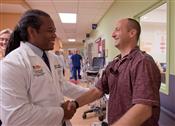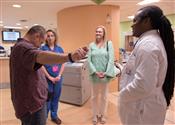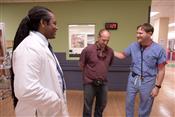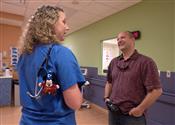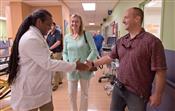When man’s heart stops, pediatric emergency team is adult-friendly
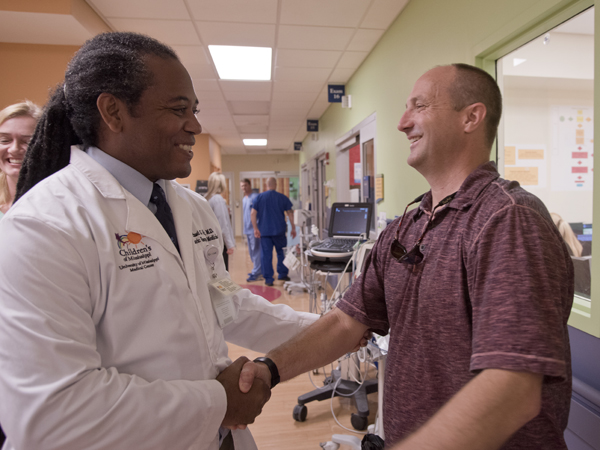
When 46-year-old David Lindsey's heart stopped beating in the bed of a truck behind a strip of shops and restaurants in Ridgeland, the first medical professionals to reach his side were an unlikely bunch.
They were summoned by Logan Russell, one of Lindsey's friends who'd just completed a group bike ride with him. Russell ran to the Sombra Mexican Kitchen in the Township at Colony Park in search of a doctor. There, he found the University of Mississippi Medical Center pediatric emergency team celebrating the retirement of Dr. Magolia Castilla, their former director.
One of the physicians was Dr. Michael Holder, who had just finished an overnight shift in the pediatric Emergency Department followed by a full day of teaching. “I got there, sat down and ordered a drink - and this gentleman bursts in,” said Holder, associate professor of emergency medicine. “At first, we thought it was a retirement prank for Dr. Castilla, but the gentleman was really quite frightened. When he pointed out an area in the parking lot, he was screaming.”
Holder and Dr. Emily Weber, professor of emergency medicine, were among those who first sprang from their seats. “We all took off in a dead sprint,” Holder said.
He jumped in the bed of the truck and began CPR on Lindsey, relieving bicyclists Rik Tice and Randy Tackett, former EMTs who'd been doing chest compressions from the time Lindsey passed out after finishing the ride at about 7 p.m. April 21.
Like he's done many times, Lindsey had ridden with a Jackson Metro Cyclists group on their regular Thursday evening route, a 20-mile loop around Lake Cavalier in Madison County that ended in the parking area behind Soulshine Pizza.
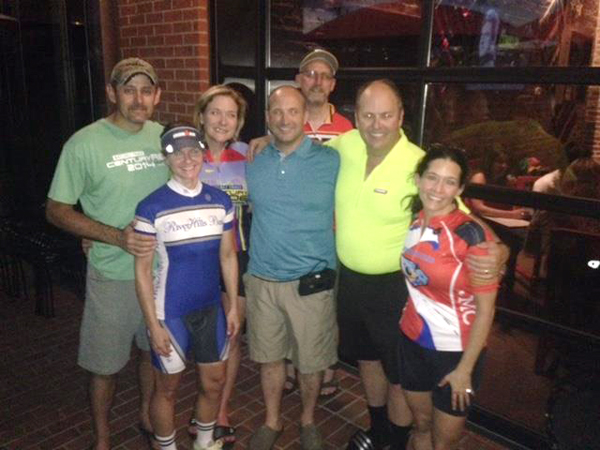
Fellow bicyclists who helped save the life of David Lindsey, center, include, from left, Randy Tackett, Denise Mills, Jill Warner, Rik Tice, T. Logan Russell and Alyssa Silberman.
“I was doing well, but then with about two miles to go, I wasn't really feeling good. I decided to soft-pedal it home and not push it,” Lindsey said. “But at the last turn about a mile away from the finish, I was thinking that maybe I was more than tired.”
With pain radiating in his neck and jaw and cramps in his forearms, Lindsey said, he limped into the parking lot. “I told the group that I was having a heart attack, and that I needed them to call 911. I told them I was sure, because I'd had one before.” That episode of severe angina about eight years ago required a stent in his left ventricular artery, which had been 90 percent blocked.
Lindsey sat on the tailgate of a friend's truck, then lay back in the truck bed. The pain in his chest worsened, and he was short of breath. “I told them that I was getting dizzy and might pass out.”
Lindsey did, about five minutes after he'd gotten off his bicycle. “That's when they noticed that my eyes had rolled back in my head and that I was coding,” he said his friends told him. Russell rushed to Sombra, hoping that at a large venue, a doctor would be in the house.
“There was,” Suzanne Lindsey, who was home when her husband suffered the heart attack, recounted in a Facebook post two days later. “He was later described to me as a handsome man with gorgeous dreadlocks. No one could tell me then his name.”
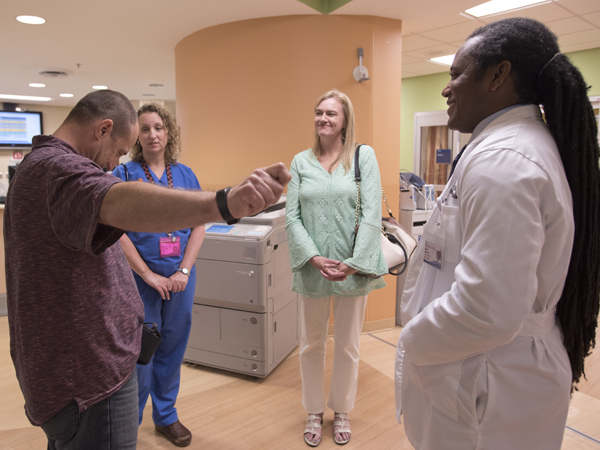
Canton resident David Lindsey, left, meets for the first time Dr. Catherine Faulk, second from left, and Dr. Michael Holder, both associate professors of pediatric emergency medicine, after they worked to save his life when he suffered a massive heart attack April 21. Also pictured is Lindsey's wife, Suzanne.
Absent that, Suzanne Lindsey gave Holder one: Dr. Awesome.
But he was just one person who worked to save Lindsey's life. “It was the whole pediatric ED team,” Holder said. “Dr. (Puja) Craddock was doing chest compressions. Aydn (Dancy, a pediatric ED nurse) did chest compressions. Dr. (Catherine) Faulk was in the back of the truck with me.”
Lindsey “was dead in the parking lot,” Faulk said. “He was blue.”
Those in the mix also included Dr. Thomas Walker; Dr. Nancy Wahl; Dr. Nan Frascogna; Ashley Arceo, a former pediatric nurse now working in DIS; and Denise Mills, a UMMC senior coder who was among the bicycling group. Craddock “walked right in and began helping run the code,” Mills remembered. “There were several nurses helping out. (Dancy) was in the truck holding an IV bag.”
Local fire department medics arrived soon after. “They brought their defibrillator, and we were able to administer it and get a rhythm back,” Holder said. “In pediatrics, we almost never use electricity. The rhythms in children usually are not shockable, but in an adult, the heart goes first.”
“Dr. Awesome from the restaurant hopped right in the ambulance and rode with David to UMMC,” Suzanne Lindsey wrote on her Facebook. “Did you catch that? He just climbed into the ambulance!”
When her husband didn't return to their Canton home by 7 as planned, Suzanne Lindsey said, she thought he was just running late. The mom of five had just returned from taking her 13-year-old, Michael, to the doctor for a sinus infection - and while she was there, her phone died.
“I started cooking and had my phone plugged in,” Lindsey said. “Once it got powered up, it rang, but I didn't run to get it. I was still cooking. But after I got back to it, I saw a text from my pastor that said to call him ASAP. He told me that David had a heart attack.”
She didn't want their four kids at the house to panic. “I told them, 'Dad's had another episode.'''
“All in all, we got him from the incident to the cath lab in under 30 minutes,” Holder said. “We are all pediatric folks, and we don't usually do this. It was a testament to our training.”
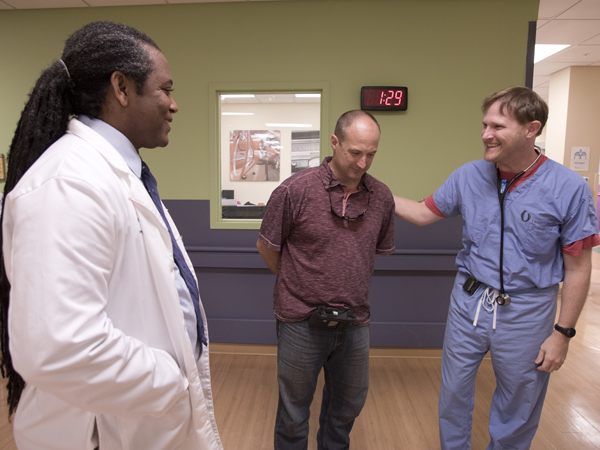
Holder reminisces with Dr. Cameron Guild, right, associate professor of cardiology. They're among UMMC doctors who helped save the life of heart attack patient Lindsey.
Dr. Cameron Guild, associate professor of cardiology, and the adult Emergency Department team took it from there. Lindsey had gone from practical death to “joking around when we first took him into the cath lab.
“We opened up his left anterior descending artery. It was 100 percent blocked,” Guild said. “There was no blood flow in the vessel at all. Fortunately, we were able to balloon and stent it very quickly.”
But before that, Lindsey's heart went into ventricular tachycardia, a heart attack complication that can result in a pulse rate of more than 200 beats per minute and quickly be fatal. “We shocked him quickly and he came out of it, but a minute or two later, we had to shock his heart again,” Guild said. “Heart attacks are serious business, and bad things can happen fast. That's why we always have them hooked up to (defibrillator) pads.”
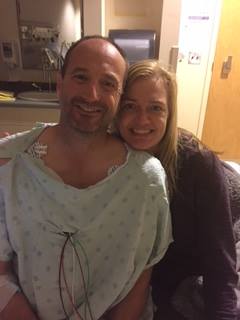
Two days after suffering a massive heart attack in the back of a Ridgeland strip mall, Canton resident David Lindsey spent several days at UMMC. With him is wife Suzanne.
Lindsey spent that night in the cardiac ICU and was moved to a regular room the next night. “So, here we are Saturday morning, and I tell David that I'm going to walk down to the cafeteria to get something to eat,” Suzanne Lindsey said.
“You will never believe who was there getting breakfast. Dr. Awesome,” she said. His gorgeous dreadlocks, she said, gave him away.
“I had to ask if he was the one that God used to save my husband,” Suzanne Lindsey said.
“We just stumbled into each other,” Holder said. “She said, 'It has to be you. You have long hair. Are you Dr. Holder?' She gave me a big hug.”
Just a week to the day Lindsey suffered the heart attack, he had a reunion at Sombra with those who helped him. “The riders and the ED staff - many of them showed up,” he said. “I was able to hear their stories and tell them thank you. It was very therapeutic for me.”
Holder was working and couldn't make it to the Sombra gathering. But he, Guild and Faulk met David Lindsey for the first time May 6 in a visit arranged in the UMMC pediatric emergency department.
“You're my first memory of the whole event,” Lindsey told Holder. “I remember asking you in the ambulance if I was going to die, and you told me that this wasn't my day.”
“I called your mom for you, and she said, 'Was he riding his bike? Sometimes, he does that too much,''' Holder told him.
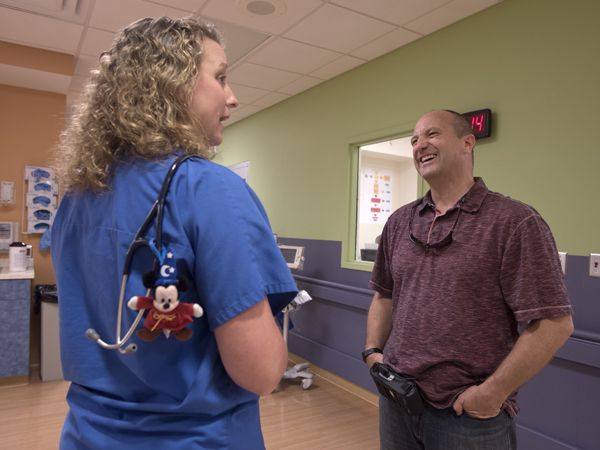
When Canton resident David Lindsey suffered a major heart attack in back of a Ridgeland strip mall, one of those who saved his life was Dr. Catherine Faulk, associate professor of pediatric emergency medicine.
Guild is optimistic Lindsey will have a good recovery. “The fact that he survived after getting to the hospital is a good start,” he said. “This had the potential to be a massive heart attack.”
A good exercise regimen will prevent a heart attack in most people because of the health benefits, Guild said. “In a very small number of people, exercise will cause it.
Lindsey's case is just one more reminder that defibrillators should be readily available to the public, and that everyone should know the basic maneuvers of CPR, Holder said. He teaches those skills in the Department of Emergency Medicine's simulation lab. “Just doing chest compressions as hard and fast as you can makes a huge difference until help arrives,” he said. “It's great to see that the things you teach mean something.”
“If you look at the statistical chance of all this happening, there's no way that this was an accident,” David Lindsey said. “It was an emergency room in the back of a pickup truck. It was so perfectly orchestrated. I definitely feel like the Lord's hand was on me.”
He continues to rest and recover. Bike riding is not on his schedule, although he and Suzanne are walking 30 minutes a day.
“The day we got back from the hospital, he asked me to cut his hair because his chest was so sore,” Suzanne Lindsey said. “Usually, he does it himself. I was cutting his hair, and I started laughing, and he asked me why.
“I told him, 'I'm happy. I'm happy that I can cut your hair. I'm glad that you're here so that I can cut your hair.'''



